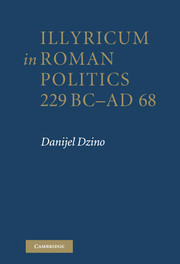Book contents
- Frontmatter
- Contents
- List of figures
- List of maps
- List of tables
- Acknowledgments
- Timeline
- 1 Introduction, approaches, review of sources and secondary literature
- 2 Illyricum in Roman foreign affairs: historical outline, theoretical approaches and geography
- 3 Roman trans-Adriatic engagement (229–168 BC)
- 4 Rome across the Adriatic in the late Republic (167–59 BC)
- 5 The construction of Illyricum: Caesar in Illyricum and the Civil Wars (59–44 BC)
- 6 Octavian in Illyricum
- 7 From senatorial to imperial Illyricum: Bellum Pannonicum
- 8 The failure of Greater Illyricum: the Bellum Batonianum
- 9 Iulio-Claudians in Illyricum: the tale of two provinces
- Conclusion: the construction of Illyricum in Roman political discourse
- Bibliography
- Index
5 - The construction of Illyricum: Caesar in Illyricum and the Civil Wars (59–44 BC)
Published online by Cambridge University Press: 05 May 2010
- Frontmatter
- Contents
- List of figures
- List of maps
- List of tables
- Acknowledgments
- Timeline
- 1 Introduction, approaches, review of sources and secondary literature
- 2 Illyricum in Roman foreign affairs: historical outline, theoretical approaches and geography
- 3 Roman trans-Adriatic engagement (229–168 BC)
- 4 Rome across the Adriatic in the late Republic (167–59 BC)
- 5 The construction of Illyricum: Caesar in Illyricum and the Civil Wars (59–44 BC)
- 6 Octavian in Illyricum
- 7 From senatorial to imperial Illyricum: Bellum Pannonicum
- 8 The failure of Greater Illyricum: the Bellum Batonianum
- 9 Iulio-Claudians in Illyricum: the tale of two provinces
- Conclusion: the construction of Illyricum in Roman political discourse
- Bibliography
- Index
Summary
In 59 BC Caius Iulius Caesar was appointed pro-consul of Cisalpine Gaul, and in addition he received command over Illyricum by means of the lex Vatinia de imperio Caesaris. The ultimate significance of this fact for the destiny of the Republic overshadows another important thing – the de iure construction of Illyricum in Roman political and administrative discourse. This was the first time we know of that a Roman magistrate was entrusted with provincia stretching over the whole eastern Adriatic coast. Earlier instances of provinciae that Roman magistrates held in this area in the earlier period were limited to individual indigenous peoples, and the provincia of Anicius in 168 BC was related only to the regnum Illyricum. The lex Vatinia was a crucial change in Roman trans-Adriatic relations. With this law, Roman power over the whole eastern coast of the Adriatic was legally defined, and Illyricum was de iure constructed as a political concept. True, it was not yet a province with strictly defined borders, but the very fact that Illyricum was now the space where Roman political, legal and military power was directly and permanently projected signalled the last stage in Roman trans-Adriatic engagement, and at the same time can be recognised as a foundation of Illyricum in Roman political discourse.
This chapter deals with the period of Caesar's pro-consulate in Illyricum 59–50 BC, and the Civil Wars. For this period our sources are much more abundant than for the mid- to late Republican period.
- Type
- Chapter
- Information
- Illyricum in Roman Politics, 229 BC–AD 68 , pp. 80 - 98Publisher: Cambridge University PressPrint publication year: 2010



